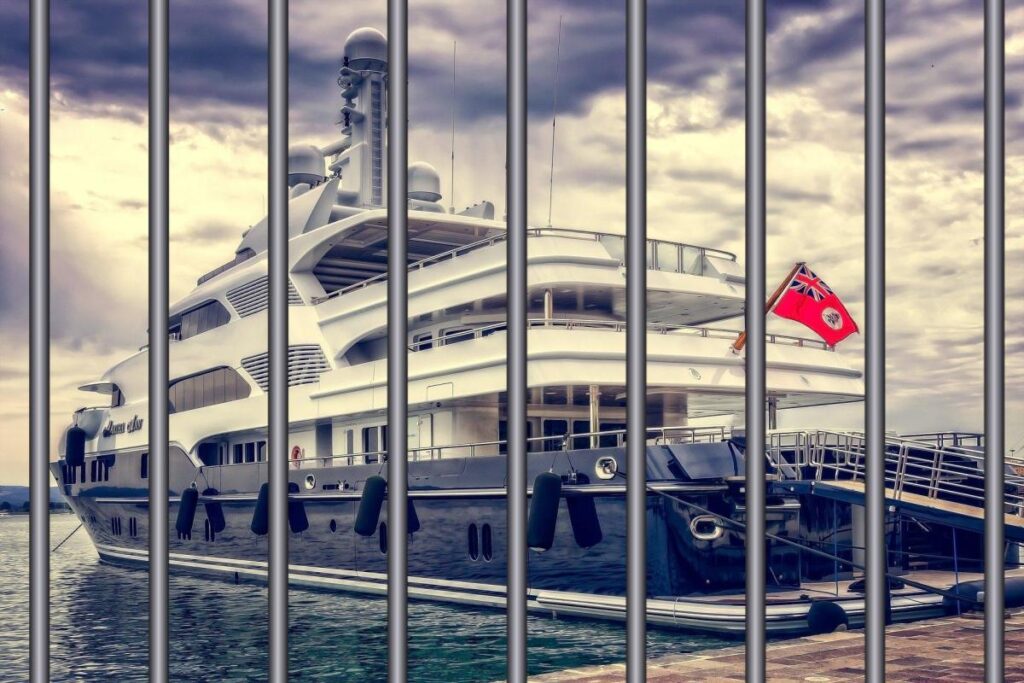A new task force is leading the charge to seize proceeds from “the crimes of Russian oligarchs.” The action is tied to a law used as a tool against terrorists and fugitives. President Joe Biden gave a stern warning Tuesday night to Russia’s richest billionaires and business elite that the United States and its allies will “find and seize their yachts, their luxury apartments, their private jets” in retaliation for the country’s military invasion of Ukraine.
“We’re coming for your ill-begotten gains,” Biden said during his State of the Union address to applause from both Democrats and Republicans.
On Wednesday, the Department of Justice announced the formation of a special unit, the Task Force KleptoCapture, that will lead the charge to seize proceeds from “the crimes of Russian oligarchs.” One of its first steps will be locating their U.S.-based holdings — an onerous undertaking because many are known to launder their money through real estate, as well as other alternative assets, such as art, jewelry and yachts. And financial experts say those oligarchs are able to cloak their true identities as owners by creating shell companies and benefiting from major disclosure loopholes in private equity and luxury goods.
Tracing money and asset ownership through foreign banks, while a time-consuming and Byzantine process, is already being done by a Justice Department-operated “kleptocracy unit” launched in 2010, said Stefan Cassella, a former federal prosecutor and an expert in asset forfeiture law. But the creation of an official task force specifically targeting Russian oligarchs is an encouraging sign, he said, because it shows “resources are being added so now they can take on more of these cases.”
If federal investigators connect the dots between an oligarch and that person’s assets here, what then is the likelihood the U.S. government can swoop in and ultimately confiscate the individual’s sources of wealth?
.
.
For starters, it’s legal under the Civil Asset Forfeiture Reform Act, which has its roots in the 18th century when America would seize cargo from foreign ships that didn’t pay a customs or import tax. It also grew in use as a drug law enforcement tool in the 1980s, and it’s a common tool against terrorists and fugitives.
The law allows one’s assets to be forfeited to the federal government in connection with a long list of federal or foreign crimes, but it’s a separate action from any criminal litigation. Civil forfeiture laws have become popular ways for state and local governments to raise revenue, although critics say it’s a practice abused by law enforcement to profit off of criminal activity.
Under the law, prosecutors can consider freezing the asset or seizing it, which requires a probable cause standard and potentially a warrant from a judge.
The freezing or blocking of an asset means it can’t be sold or transferred and U.S. citizens can’t engage in any transaction involving it, said Jimmy Gurulé, a law professor at the University of Notre Dame and a former undersecretary for enforcement at the Department of the Treasury during the George W. Bush administration.
“You can still live on the yacht, but you certainly can’t transfer it,” he said.
Seizing the asset goes further. If prosecutors believe it has a specific link to illegal activity, including that it was derived from it, they may seek to confiscate it and ultimately have the U.S. gain ownership.
.

Russian businessman Deripaska’s Washington home searched by FBI
.
FBI agents carry out a search of Russian oligarch Oleg Deripaska’s home in Washington on Oct. 19, 2021. Deripaska and other prominent Russians were previously sanctioned by the U.S. in 2018 over their ties with Vladimir Putin.
A person whose asset is being seized has the opportunity to get it back through the courts. If the person chooses to do so, the burden of proof is on the U.S. government to show the asset is connected to criminal activity. In the case of a Russian oligarch, prosecutors won’t need to furnish evidence that person or the asset is directly tied to the conflict in Ukraine or the funding of attacks, Cassella said.
“They have to prove the underlying crime, but it doesn’t have to do with war crimes or Ukraine,” he said.
During court proceedings, the person may still be given access to the asset or the government can get a restraining order in which the person can’t touch it. For something like an apartment building that may have tenants and where the income is potentially at the center of illegal activity, the government may ask that any rents be paid into an escrow pending the resolution of the case.
The U.S. has seized assets from foreign leaders and business figures before. Teodoro Nguema Obiang Mangue, the vice president of Equatorial Guinea, was accused of using his position in 2011 as the country’s then-minister of agriculture and forestry to amass more than $300 million through corrupt practices and money laundering that federal prosecutors say also broke U.S. law.
The Justice Department took Obiang to court and eventually settled, requiring him to sell a Malibu, California, mansion he bought for $30 million, a Ferrari and various pieces of Michael Jackson memorabilia. More than $10 million of the settlement was forfeited to the U.S. (The civil forfeiture matter was docketed as the United States v. One Michael Jackson Signed Thriller Jacket.)
A civil forfeiture isn’t the only way the government can get hold of an asset. If someone is convicted criminally, the person’s wealth can also be seized during the sentencing phase if prosecutors show it’s linked to the illegal activity.
But convicting a Russian oligarch of a crime would likely be more difficult than the civil forfeiture route since it requires bringing them to the U.S. to stand trial, Cassella said.
Ultimately, what happens to an asset once the U.S. acquires it?
Gurulé said it could be sold at auction with the profits going back to the government’s coffers or it could be repurposed.
As a federal prosecutor in California, he recalls once flying in a Drug Enforcement Administration plane to Mexico. That plane, it turned out, had been confiscated by federal officials from a Mexican cartel, which previously used it to transport drugs to the U.S.
.
March 3, 2022 Published by NBC News.







